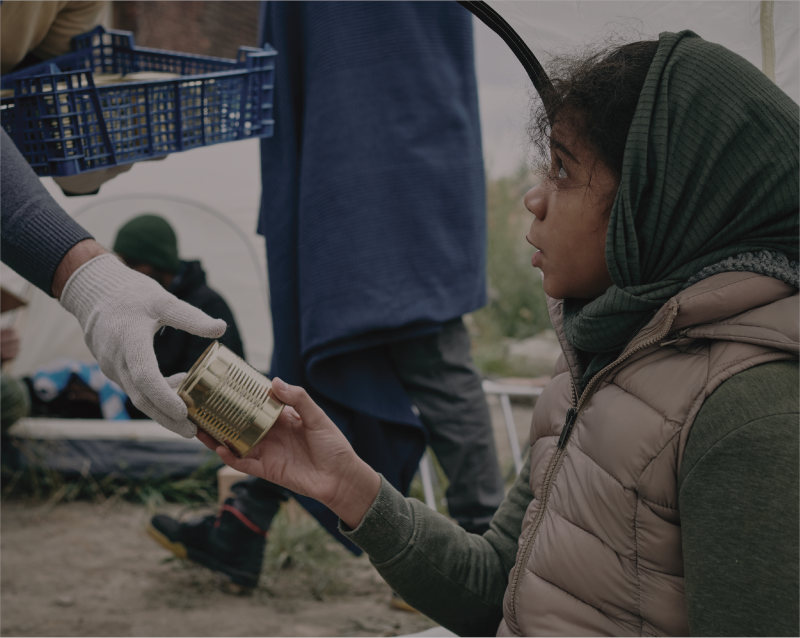Noreen Lazo grew up with everything she thought she needed: food, water, shelter, schooling. But something was always missing. Now that she’s grown, she knows exactly what it was—unconditional love.
“My parents were terrible parents, so I grew up with a lot of challenges,” says Lazo, 36, of Long Beach, California, who endured years of emotional abuse until she married her husband and had a child.

At the age of 25, she realized she deserved better. And so, she struck out on her own with her new family. Unfortunately, doing so placed her in opposite circumstances. Although she finally had love, she suddenly lacked everything else.
“I went to the deepest bottom that I could hit,” continues Lazo, who ended up experiencing homelessness and joblessness. When she eventually found housing, it was in a fifth-wheel trailer in the impoverished Watts neighborhood of Los Angeles. She desperately needed support and hit one brick wall after another trying to find it. “I had a lot of struggles trying to get help. I didn’t know where to turn. I had always assumed there were social services and programs available for people who need assistance, but that wasn’t true. There were so many hoops to jump through.”
A decade later, Lazo is grateful to be both emotionally and financially secure. But the memory of hardship remains, which is why she wants to become a licensed clinical social worker.
“Because of my experience in poverty, my dream is to establish a home for struggling families who don’t qualify for social welfare,” says Lazo, who graduated in May from the Master of Social Work (MSW) program at Pacific Oaks College. “I’ve become self-sufficient, even with a lack of resources, and I want to help other families do the same.”
To help their clients break the chains of poverty, social workers of all backgrounds and means must learn to recognize poverty, to appreciate what it actually means to be impoverished, and to apply their unique skills in ways that can impact not just the individuals who live in poverty but also the systems that put them there in the first place.
A Profound Moral Failing
Approximately 37 million Americans live in poverty, according to the U.S. Census Bureau, which says the official poverty rate was 11.4% in 2020, up from 10.5% in 2019.
Poverty is especially endemic among youth, women, and people of color. Among non-Hispanic whites, for example, the poverty rate is 8.2%. For Hispanics, it’s 17%. It’s even higher for Blacks, at 19.5%. The poverty rate is 16.1% for people under the age of 18, and 23.4% for families with a female head of household.
While the government defines poverty according to income—the federal poverty threshold is $13,590 for individuals, and $27,750 for a family of four—dollars and cents tell only part of the story, according to Sandra Hill-Glover, Ed.D., MSW, associate dean of social work programs and MSW program director in the School of Cultural and Family Psychology at Pacific Oaks College.
“It’s easy to focus on just the economics of it. But as you evolve your thinking, you begin to understand that poverty really is a profound moral failing,” Dr. Hill-Glover says. “It’s not just transactional. It’s more than not having enough resources. It’s the inability to meet the basic needs of housing, food, education, and health care—and that is systemic.”
In that way, poverty is as much about what individuals can achieve as it is what they can afford—especially when it comes to children.
“Poverty for children can mean unstable housing, food insecurity, and separation from parents and caregivers,” says Cassandra Peel, Ph.D., MSW, a core faculty in Pacific Oaks’ MSW program. “That is an adverse childhood experience, which literally changes how your brain develops and how your body responds to stress. As one ages, that can be linked to chronic mental and physical health problems, and even substance abuse.”
Because there are second- and third-order effects—for public health, education, crime, and quality of life—there are as many consequences for communities as there are for individuals and families.
“Yes, poverty is very indicative of financial stress. But it’s also about adverse social outcomes,” Dr. Peel continues. “It’s things like reduced rates of homeownership, a decreased likelihood of attending college, and extremely poor health outcomes. And that’s because impoverished communities have fewer tools in their toolbox.”

Due to current events, including COVID-19 and rapid inflation, the toolbox for impoverished communities is becoming even more sparse and the effects even more acute. In fact, research shows that unemployment, food hardship, housing insecurity, and financial distress all increased during the pandemic and remain high in the communities that are most vulnerable to poverty.
“If you agree with the notion that everyone has a right to ascend to their best selves and to have their basic needs met, then you have to see poverty for what it really is,” Dr. Hill-Glover says. “Poverty is a social justice issue.”
Disrupting Poverty with Social Work
“Social workers have a front row seat to the effects of poverty,” according to Dr. Peel, who says social workers are ideally positioned to make positive impacts on poverty at both the micro and macro level.
Pacific Oaks is preparing them to make those impacts in myriad ways, Dr. Hill-Glover says. Perhaps the most fundamental is helping students stay out of poverty themselves by way of obtaining a degree.
“Educational attainment has been shown to be a disruptor for groups who have been marginalized or caught in a cycle of poverty,” Dr. Hill-Glover says. “So as a program, we have a responsibility to serve students who historically have been shut out of higher education.”
Because many of them—like Lazo—have experienced poverty firsthand, Pacific Oaks graduates are particularly well suited to effect meaningful change. To amplify their natural empathy and channel it in ways that can serve clients and communities, the Pacific Oaks curriculum teaches students to understand the systemic causes and effects of poverty and to approach the communities they serve from a place of abundance.
“Rather than looking at communities from a pejorative place—we want to shift the paradigm so our communities are seen as a resource,” Dr. Hill-Glover says. “It’s looking at their assets instead of their deficiencies, and helping them leverage their strengths in ways that help them move beyond their circumstances.”
That mindset is ingrained in students not only in the classroom, but also in the field, according to Dr. Hill-Glover, who says the Field Education Program is a hallmark of social work studies at Pacific Oaks. The program requires students complete 420 hours of supervised experience in a clinical setting where they can apply their knowledge, skills, and values.
Many people mistakenly associate poverty with entitlement. Instead, what students take away from their schoolwork and fieldwork is the importance of empowerment, according to Lazo. “Empowering clients is the number one thing,” she says. “We can’t change their circumstances, but we can empower clients to move beyond their shame and trauma, and to take actions that will help them live a happy and self-sufficient life.”
Empowerment also has been a key message for first-year MSW student Natalie Simpson, 37, of Santa Cruz, California, who works with low-income children and families as a teacher director for Head Start. One of the most important things she’s learned, she says, is the intersection of policy and practice. In a recent class, for example, she studied the Family Self-Sufficiency Act, a little-known bill that helps recipients of federal housing assistance build wealth by accruing savings in a special escrow account. Upon learning about the program, she began working with stakeholders in her county to actively promote it to qualifying families.
“As social workers, we’re mediators in policy,” Simpson says. “We can look for gaps in the system, help people navigate it, and bring to light what changes need to happen in order to address problems.”
That’s a revelation. “When I started social work, I was just looking at it through the micro lens—as a direct service provider,” Simpson continues. “Now I’ve started looking at it on a macro level. There are so many other ways that I can make a positive impact, whether it’s through policy, the media, writing journal pieces, or just connecting with people.”
Echoes Peel, “You can do volunteering. You can do protesting. You can do coalition work. Service can look a lot of different ways.”
And yet, one of the most important things social workers can do is to simply exist, Dr. Hill-Glover says. “Poverty is one of the wicked problems social work seeks to address,” she concludes. “We call them ‘wicked problems’ because they’re so complex and so difficult to solve. As social workers, however, we gravitate toward challenges because we see what’s possible. That sense of hope and optimism is a critical component of disrupting poverty.”
Learn more about Pacific Oaks College
If you would like to learn more about the academic programs available at Pacific Oaks, fill out the form below to request more information, or you can apply today through our application portal.

